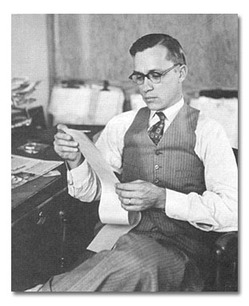Publisher of N.C. newspaper that won historic Pulitzer for anti-Klan crusade dies
 W. Horace Carter, the founding publisher of a small-town North Carolina newspaper that won a Pulitzer Prize in 1953 for his reporting on and editorials against the Ku Klux Klan, died yesterday in Wilmington, N.C. following a heart attack. He was 88.
W. Horace Carter, the founding publisher of a small-town North Carolina newspaper that won a Pulitzer Prize in 1953 for his reporting on and editorials against the Ku Klux Klan, died yesterday in Wilmington, N.C. following a heart attack. He was 88.Born on Jan. 20, 1921 in Stanly County, N.C., Carter graduated from the University of North Carolina with a journalism degree. He went on to found the weekly Tabor City Tribune in Tabor City, N.C., a town in Columbus County along the South Carolina border, publishing the first issue on July 6, 1946.
In 1950, after witnessing a Ku Klux Klan motorcade drive through Tabor City, Carter began reporting on and editorializing against the white-supremacist terrorist group, which at the time was resisting the growing Civil Rights Movement. In an article reporting on the motorcade titled "Ku Klux Klan Here on Saturday Night," Carter wrote:
At exactly 9:22 last Saturday night, the much discussed Southern Society of the Ku Klux Klan made an infamous tour through Tabor City with some 30-odd cars and with three to four occupants in each vehicle.In the same edition of the paper he editorialized:
The trek wound around through the colored sections as well as down the main streets of town, sirens blew and some blank shots were fired. All in all it appeared that the KKK was putting on some kind of a recruiting drive, but in the meantime they monopolized the streets, created a general confusion, caused many persons to believe there was a fire including some firemen, and then after gathering their forces departed in the general direction of Loris. It is said that the police department in that town escorted the parade through the city.
In Tabor City, no effort was made to stop them or to encourage them and so far as is known no violence occurred.
The marauders were believed to be largely South Carolinians and almost every car carried a South Carolina license. The occupants wore their traditional robes but most of them had their hoods pushed back off their face in an effort to keep within the law's ruling that no hooded gangs may operate.
Many local citizens were considerably disturbed by the demonstration, and it is understood that the Federal Bureau of Investigation has been notified that the Klan is operating in this area and that they have been asked to intercede should any incident occur of a lawless nature that could not be handled by law enforcement.
In this democratic country, there's no place for an organization of the caliber of the Ku Klux Klan which made a scheduled parade through our streets last Saturday night. Any organization that has to work outside the law is unfit for recognition in a country of free men. Saturday's episode, although without violence, is deplorable, a black eye to our area and an admission that our law enforcement is inadequate.Three years and 130 stories later, the Tabor City Tribune became the first weekly newspaper to win the Pulitzer Prize for Meritorious Public Service for its work on the Klan. It shared the award with the News Reporter in nearby Whiteville, N.C. under editor Willard Cole, who along with Carter received numerous threats.
Sanctioning of their methods of operation is practically as bad as if you rode in their midst. It takes a united front to combat lawlessness. It takes all the law abiding people as a unit to discourage and combat a Ku Klux Klan that is totally without law. The Klan, despite its Americanism plea, is the personification of Fascism and Nazism. It is just such outside-the-law operations that lead to dictatorships through fear and insecurity.
Their crusade helped helped lead to the convictions of 254 Klansmen, with 62 sent to prison or fined, the Wilmington (N.C.) Star-News reports.
Carter's newspaper, since renamed the Tabor-Loris Tribune, remains under the control of the family-owned Atlantic Corp., headed by Carter's son, Rusty Carter, who said of his father:
"He was an inspiration to many, and friend to everyone he met, and a legend in community journalism for over 50 years. His commitment to social justice, God and country, his family and friends never wavered regardless of the challenge."A service is planned for Saturday to celebrate W. Horace Carter's life.
(Historic photo of W. Horace Carter is from the Carter-Klan Documentary Project at the Center for the Study of the American South at UNC-Chapel Hill)
Tags
Sue Sturgis
Sue is the former editorial director of Facing South and the Institute for Southern Studies.
